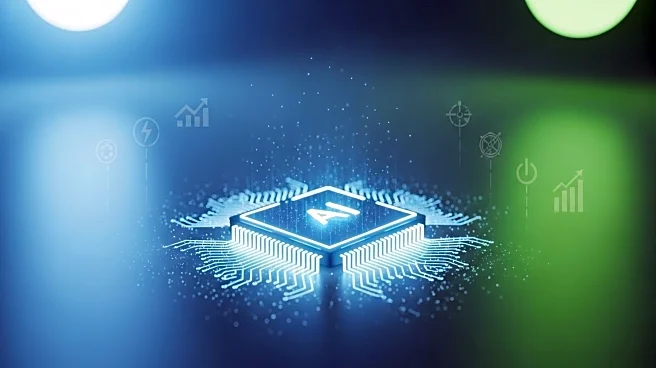What's Happening?
OpenAI has announced a partnership with Broadcom to design and develop 10 gigawatts of custom AI chips and systems. This collaboration aims to address the increasing power demands of AI technologies, such as ChatGPT and the newly released Sora video generation app. OpenAI's CEO, Sam Altman, emphasized the importance of this partnership in building the necessary infrastructure to unlock AI's potential. The deployment of these AI accelerator and network systems is expected to begin in the second half of 2026. The deal highlights the significant power consumption associated with AI, with the planned systems using as much electricity as 8 million US households. This development follows previous partnerships with Nvidia and AMD, as OpenAI seeks to secure more computing resources for its expanding user base.
Why It's Important?
The partnership between OpenAI and Broadcom underscores the growing energy demands of AI technologies, which have implications for both the tech industry and environmental sustainability. As AI applications like ChatGPT and Sora continue to expand, the need for efficient and powerful computing resources becomes critical. This deal not only positions OpenAI to better manage its hardware needs but also raises concerns about the environmental impact of increased energy consumption. The Department of Energy has projected that data centers could consume up to 12% of total US electricity by 2028, highlighting the need for sustainable solutions in the tech sector. Broadcom's involvement also signals potential growth opportunities for the company, as its shares rose significantly following the announcement.
What's Next?
The deployment of the AI systems is set for the latter half of 2026, which will likely lead to further advancements in AI capabilities and efficiency. As OpenAI integrates its learnings from developing frontier models into hardware, new levels of AI capability and intelligence are expected. This could drive innovation in AI applications, potentially leading to more sophisticated and power-intensive models. Stakeholders, including environmental groups and policymakers, may push for regulations or incentives to mitigate the environmental impact of such developments. Additionally, other tech companies might follow suit, seeking similar partnerships to enhance their AI infrastructure.
Beyond the Headlines
The partnership between OpenAI and Broadcom could have broader implications for the tech industry, particularly in terms of hardware innovation and energy efficiency. As AI models become more complex, the demand for custom chips that can handle specific tasks efficiently will likely increase. This could lead to a shift in how tech companies approach hardware development, prioritizing energy-efficient designs. Furthermore, the environmental impact of AI's energy consumption may prompt discussions on sustainable practices within the industry, potentially influencing future policy decisions.










